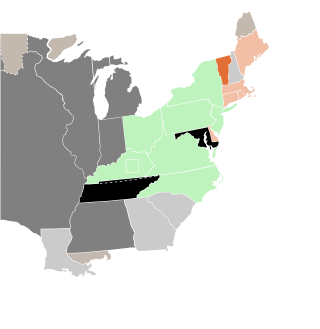Related Research Articles
The 1814–15 United States House of Representatives elections were held on various dates in various states between April 26, 1814, and August 10, 1815. Each state set its own date for its elections to the House of Representatives before the first session of the 14th United States Congress convened on December 4, 1815. They occurred during President James Madison's second term. Elections were held for all 182 seats, representing 18 states.

The 1814–15 United States Senate elections were held on various dates in various states. As these U.S. Senate elections were prior to the ratification of the Seventeenth Amendment in 1913, senators were chosen by state legislatures. Senators were elected over a wide range of time throughout 1814 and 1815, and a seat may have been filled months late or remained vacant due to legislative deadlock. In these elections, terms were up for the senators in Class 1.

The 1814 United States House of Representatives elections in New York were held from April 26 to 28, 1814, to elect 27 U.S. Representatives to represent the State of New York in the United States House of Representatives of the 14th United States Congress.

The 1816 United States House of Representatives elections in New York were held from April 23 to 25, 1816, to elect 27 U.S. Representatives to represent the State of New York in the United States House of Representatives of the 15th United States Congress. At the same time, a vacancy was filled in the 14th United States Congress.

Elections to the United States House of Representatives were held in Pennsylvania on October 13, 1812, for the 13th Congress.

Pennsylvania held its elections October 11, 1814.
Massachusetts held its elections November 7, 1814. State law required a majority vote for election, which was not met in two districts, leading to a second election January 6, 1815.

On August 2, 1813, at the end of the 1st session of the 13th Congress, Egbert Benson (F) of New York's 2nd district resigned. A special election was held for his replacement December 28–30, 1813.

A special election was held in Pennsylvania's 2nd congressional district on October 11, 1814 to fill a vacancy caused by the resignation of Jonathan Roberts (DR) upon being elected to the Senate.

A special election was held in Pennsylvania's 3rd congressional district on October 11, 1814 to fill a vacancy caused by the resignation of James Whitehill (DR) on September 1, 1814. This was the second resignation from the 3rd district in the 13th congress, the previous resignation having been in the previous year.

On August 2, 1813, Representative John Gloninger (F) of Pennsylvania's 3rd district resigned his seat. A special election to fill this vacancy was held on October 12, 1813. This was the first of two special elections held in the 3rd district in the 13th Congress.

A special election was held in Tennessee's 5th congressional district September 15–16, 1814 to fill a vacancy left by the resignation of Felix Grundy (DR) earlier that year.

On October 6, 1814, prior to the beginning of the Fourteenth Congress, Representative-elect Benjamin Pond (DR), who'd been elected to New York's 12th district, died. A special election to fill this vacancy was held in April, 1815.

A special election was held in Kentucky's 2nd congressional district in 1814 to fill a vacancy left by the resignation of Henry Clay (DR) on January 19, 1814, to accept a diplomatic position to the United Kingdom.

The 1814 United States Senate special election in Pennsylvania was held February 24, 1814. Jonathan Roberts was elected by the Pennsylvania General Assembly to the United States Senate.

The 1814 United States Senate election in Pennsylvania was held on December 10, 1814. Incumbent Jonathan Roberts was elected by the Pennsylvania General Assembly to the United States Senate.

Kentucky held its elections August 3, 1814.

A special election was held in New Jersey's at-large congressional district October 10–11, 1814 to fill a vacancy left by the death of Jacob Hufty (F) on May 20, 1814.
A special election was held in Massachusetts's 12th congressional district on August 4, 1814, to fill a vacancy left by the resignation of Daniel Dewey (F) on February 24, 1814, having been appointed justice of the Supreme Judicial Court of Massachusetts
The 1814 United States elections occurred in the middle of Democratic-Republican President James Madison's second term, during the First Party System. Members of the 14th United States Congress were chosen in this election. During the 14th Congress, Indiana joined the union. The election took place during the War of 1812.
References
- 1 2 13th Congress membership roster Archived 2012-12-13 at the Wayback Machine
- ↑ Election details from Ourcampaigns.com